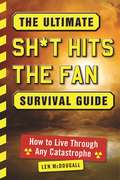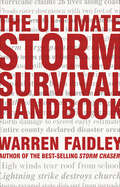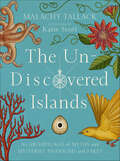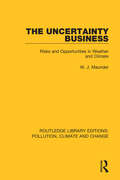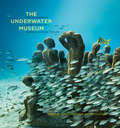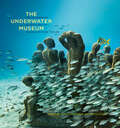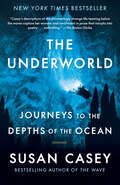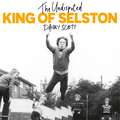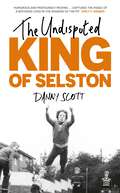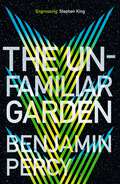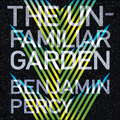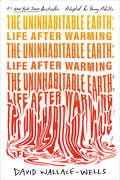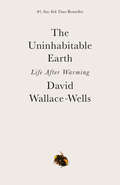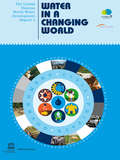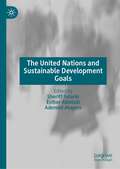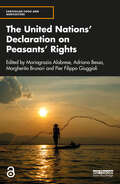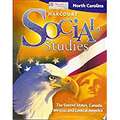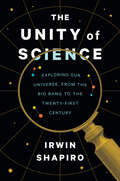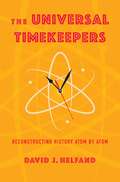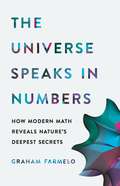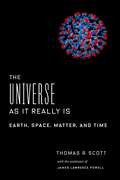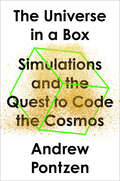- Table View
- List View
The Ultimate Sh*t Hits the Fan Survival Guide: How to Live Through Any Catastrophe
by Len McDougallThe world is changing before our very eyes. Today we deal with serious social, political, economic, and environmental issues that affect our everyday lives. With this change we must adapt, and by adapt we mean be prepared to survive when things go south and society crumbles.Len McDougall has spent his entire life-almost sixty years-learning the nuts and bolts of staying alive under adverse conditions. And now more than ever will we need to take his lessons seriously, as understanding what to expect and how to adapt will increase the odds for survival.The Ultimate Sh*t Hits the Fan Survival Guide is just that. Featuring methods that have been personally tested through hard, field-proven experiences, you will learn everything needed to survive when things fall apart and you’re left to fend for yourself.Included in this book are many lessons on survival, including:The best method of starting a fire.Obtaining portable water from any body of water or stream without using tools, fire, or chemicals.The simplest method for catching a meal.Surviving in possible combat, whether through weapon training or hand-to-hand.And so much more.Times are indeed changing, and it’s now a necessity to be prepared for whatever obstacles may come your way. The Ultimate Sh*t Hits the Fan Survival Guide is just that; a collection of tips, tricks, lessons, and knowledge from a professional survivalist that will make sure you will not only survive, but thrive when catastrophe strikes.
The Ultimate Shark Field Guide: The Ocean Explorer's Handbook (Sharks, Observations, Science, Nature, Field Guide, Marine Biology for Kids)
by Thomas NelsonSwim alongside your favorite underwater creatures with The Ultimate Shark Field Guide--created as if a marine biologist painted these illustrations and made these notes while out collecting research.Pick up the journal of a marine biologist and discover underwater mysteries with The Ultimate Shark Field Guide. Encounter sharks of all shapes and sizes and note observations on each species' appearance, size, diet, and more. Detailed watercolor illustrations will captivate young readers. This spectacular visual guide gets you up close and personal with some of the fiercest creatures on Earth, including the bull shark, the great white, the Ganges river shark, the whale shark, and the great hammerhead. Explore underwater landscapes with these incredible animals in The Ultimate Shark Field Guide!
The Ultimate Storm Survival Handbook
by Warren FaidleyBe prepared to survive weather disasters no matter where you live with this complete guide. Year after year, dangerous weather become more intense—and more common. We all need to be ready for a potentially deadly storm to strike at any time. The Ultimate Storm Survival Handbook gives you all the information you need to prepare for hurricanes, tornados, blizzards, floods, hailstorms, and more. Along with clear instructions on preparing before a storm, the book also contains survival kit guidelines, helpful Websites, and quick-reference emergency checklists for each type of weather event. Get step-by-step instructions on: creating a plan for family survival securing your home and taking inventory caring for your pets familiarizing yourself with your area's storms and storm safety knowing what the warnings mean planning for the infirm and elderly
The Un-Discovered Islands: An Archipelago of Myths and Mysteries, Phantoms and Fakes
by Malachy TallackIn The Un-Discovered Islands, critically acclaimed author Malachy Tallack takes the reader on fascinating adventures to the mysterious and forgotten corners of the map.Be prepared to be captivated by the astounding tales of two dozen islands once believed to be real but no longer on the map. These are the products of the imagination, deception, and human error: an archipelago of ex-islands and forgotten lands. From the well-known story of Atlantis and the mysteries of frozen Thule to more obscure tales from around the globe, and from ancient history right up to the present day, this is an atlas of legend and wonder, with glorious illustrations by Katie Scott.
The Uncertainty Business: Risks and Opportunities in Weather and Climate
by W. J. MaunderOriginally published in 1986, this book discusses the value of weather and climate information in government and business decision-making. It issues a strong manifesto for the development of new areas of research requiring the skills of weather scientists, geographers, economists, planners and political scientists. It offers a coherent and non-technical presentation of this climatology, supported with practical guidance on assessing the impacts of weather and climate on human affairs.
The Underwater Alphabet Book (Jerry Pallotta's Alphabet Books)
by Jerry PallottaLearn your ABCs in this aquatic exploration of the coral reef. Best-selling author Jerry Pallotta delivers a fun first concepts book that covers sea creatures from A to Z. From the well-known Angelfish to lesser known Humu humu nuku nuku apua'a all the way to Zebra Pipefish, readers will be introduced to over twenty-six tropical species that live in and around the coral reef. Edward Stewart's detailed and vibrant illustrations bring the reader into the colorful underwater world. Covering habitats to inhabitants, this alphabetical journey is told both with wit and scientific accuracy that makes for a fun and funny read aloud that kids and parents will be eager to dive into.
The Underwater Museum: The Submerged Sculptures of Jason deCaires Taylor
by Helen Scales Jason DeCaires Taylor Carlo McCormickA one-of-a-kind blend of art, nature, and conservation, The Underwater Museum re-creates an awe-inspiring dive into the dazzling under-ocean sculpture parks of artist Jason deCaires Taylor. Taylor casts his life-size statues from a special kind of cement that facilitates reef growth, and sinks them to the ocean floor. There, over time, the artworks attract corals, algae, and fish, and evolve into beautiful and surreal installations that are also living reefs. This volume brings readers face to face with these wonders and explains the science behind their creation. Ocean enthusiasts, divers, art lovers, and anyone entranced by the natural world will be instantly engrossed by this pearl of a book.
The Underwater Museum: The Submerged Sculptures of Jason deCaires Taylor
by Jason Decaires Taylor Helen Scales Carlo MccormickA one-of-a-kind blend of art, nature, and conservation, The Underwater Museum re-creates an awe-inspiring dive into the dazzling under-ocean sculpture parks of artist Jason deCaires Taylor. Taylor casts his life-size statues from a special kind of cement that facilitates reef growth, and sinks them to the ocean floor. There, over time, the artworks attract corals, algae, and fish, and evolve into beautiful and surreal installations that are also living reefs. This volume brings readers face to face with these wonders and explains the science behind their creation. Ocean enthusiasts, divers, art lovers, and anyone entranced by the natural world will be instantly engrossed by this pearl of a book.
The Underworld: Journeys to the Depths of the Ocean
by Susan CaseyNEW YORK TIMES BESTSELLER • From bestselling author Susan Casey, an awe-inspiring portrait of the mysterious world beneath the waves, and the men and women who seek to uncover its secrets&“An irresistible mix of splendid scholarship, heart-stopping adventure writing, and vivid, visceral prose." —Sy Montgomery, New York Times best-selling author of The Soul of an Octopus For all of human history, the deep ocean has been a source of wonder and terror, an unknown realm that evoked a singular, compelling question: What&’s down there? Unable to answer this for centuries, people believed the deep was a sinister realm of fiendish creatures and deadly peril. But now, cutting-edge technologies allow scientists and explorers to dive miles beneath the surface, and we are beginning to understand this strange and exotic underworld: A place of soaring mountains, smoldering volcanoes, and valleys 7,000 feet deeper than Everest is high, where tectonic plates collide and separate, and extraordinary life forms operate under different rules. Far from a dark void, the deep is a vibrant realm that&’s home to pink gelatinous predators and shimmering creatures a hundred feet long and ancient animals with glass skeletons and sharks that live for half a millennium—among countless other marvels.Susan Casey is our premiere chronicler of the aquatic world. For The Underworld she traversed the globe, joining scientists and explorers on dives to the deepest places on the planet, interviewing the marine geologists, marine biologists, and oceanographers who are searching for knowledge in this vast unseen realm. She takes us on a fascinating journey through the history of deep-sea exploration, from the myths and legends of the ancient world to storied shipwrecks we can now reach on the bottom, to the first intrepid bathysphere pilots, to the scientists who are just beginning to understand the mind-blowing complexity and ecological importance of the quadrillions of creatures who live in realms long thought to be devoid of life.Throughout this journey, she learned how vital the deep is to the future of the planet, and how urgent it is that we understand it in a time of increasing threats from climate change, industrial fishing, pollution, and the mining companies that are also exploring its depths. The Underworld is Susan Casey&’s most beautiful and thrilling book yet, a gorgeous evocation of the natural world and a powerful call to arms.
The Undisputed King of Selston
by Danny Scott'Evocative, beautifully written . . . conjures locations and feelings almost magically.' Jeremy Vine'My brain has made the decision . . . I am going to love this book.' Richard Hawley There was a time when he felt like the undisputed King of Selston.Then again, there were several years when he was convinced that he could talk to animals and had even mastered the power of flight - sailing nightly over the headstocks, slag heaps and doggedly beautiful countryside of an isolated East Midlands mining village.But, deep down, Danny Scott knew that the real King of Selston was and always would be coal. Over the last seven hundred years, coal dust had settled on every inch of Selston. It was in the food he ate, the air he breathed and the words he spoke. It fashioned resilient men like his dad and The Texan; feisty women like his mother, whose right-hook was feared even more than her fondness for house fires.Danny was a clever bugger - dangerously clever, some said - and fiercely proud of Selston, his dad and his mining heritage. Five generations of his family had spent their working lives underground, providing fuel for the Industrial Revolution, the electrical, rail and motoring revolutions. Without it, the modern age wouldn't have been so . . . modern.But as this young boy prepared to follow in his dad's footsteps, things began to change. The Devil became captain of the local darts team. Fortune tellers held seances in the front room of his council house. And that once unassailable King's reign seemed to be coming to an end.For dangerously clever buggers, there was only one option... somewhere else, someone new.Funny, poignant and alive to the unheralded beauty, purpose and camaraderie of a village which finds itself on the wrong side of history, THE UNDISPUTED KING OF SELSTON shines a light onto a forgotten industry and the dark shadows that wormed their way into the families who got left behind.
The Undisputed King of Selston
by Danny Scott'Evocative, beautifully written . . . conjures locations and feelings almost magically.' Jeremy Vine'My brain has made the decision . . . I am going to love this book.' Richard Hawley There was a time when he felt like the undisputed King of Selston.Then again, there were several years when he was convinced that he could talk to animals and had even mastered the power of flight - sailing nightly over the headstocks, slag heaps and doggedly beautiful countryside of an isolated East Midlands mining village.But, deep down, Danny Scott knew that the real King of Selston was and always would be coal. Over the last seven hundred years, coal dust had settled on every inch of Selston. It was in the food he ate, the air he breathed and the words he spoke. It fashioned resilient men like his dad and The Texan; feisty women like his mother, whose right-hook was feared even more than her fondness for house fires.Danny was a clever bugger - dangerously clever, some said - and fiercely proud of Selston, his dad and his mining heritage. Five generations of his family had spent their working lives underground, providing fuel for the Industrial Revolution, the electrical, rail and motoring revolutions. Without it, the modern age wouldn't have been so . . . modern.But as this young boy prepared to follow in his dad's footsteps, things began to change. The Devil became captain of the local darts team. Fortune tellers held seances in the front room of his council house. And that once unassailable King's reign seemed to be coming to an end.For dangerously clever buggers, there was only one option... somewhere else, someone new.Funny, poignant and alive to the unheralded beauty, purpose and camaraderie of a village which finds itself on the wrong side of history, THE UNDISPUTED KING OF SELSTON shines a light onto a forgotten industry and the dark shadows that wormed their way into the families who got left behind.
The Unfamiliar Garden: The Comet Cycle Book 2 (The Comet Cycle #2)
by Benjamin PercyFrom award-winning author Benjamin Percy comes the second novel in his grippingly original sci-fi series, The Comet Cycle, in which a passing comet has caused irreversible change to the growth of fungi, spawning a dangerous, invasive species in the Pacific Northwest that threatens to control the lives of humans and animals alike.It began with a comet. They called it Cain, a wandering star that passed by Earth, illuminating the night with a swampy green light and twinning the sky by day with two suns. A year later, Earth spun through the debris field the comet left behind. Suddenly, hundreds of thousands of meteors plummeted into the atmosphere, destroying swaths of electrical grids, leaving shores of beaches filled with deceased sea life, and setting acres of land ablaze. It was then, they say, that the sky fell. It was then that Jack lost Mia.Five years after the disappearance of his daughter, Jack has fallen. Once an accomplished professor of botany, he's now a shell of a man who has all but withdrawn from life. Nora, his ex-wife, has thrown herself into her investigative work. Separately, they have each bandaged over the hole Mia left behind.Just as Jack is uncovering a new form of deadly parasitic fungus in his lab, Nora is assigned to investigate the cases of ritualistic murders dotting Seattle. The rituals consist of etchings - crosshatches are carved into bodies and eyes are scooped out of their sockets. The attackers appear to be possessed.It only takes a moment - for a sickness to infect, for a person to be killed, for a child to be lost. When Nora enlists Jack to identify the cause of this string of vicious deaths, Jack is quick to help. Together, they fight to keep their moments - the unexpected laughter, the extraordinary discoveries, the chance that Mia could come back home - but they find that what they're up against defies all logic, and what they have to do to save the world will change every life forever.
The Unfamiliar Garden: The Comet Cycle Book 2 (The Comet Cycle #2)
by Benjamin PercyFrom award-winning author Benjamin Percy comes the second novel in his grippingly original sci-fi series, The Comet Cycle, in which a passing comet has caused irreversible change to the growth of fungi, spawning a dangerous, invasive species in the Pacific Northwest that threatens to control the lives of humans and animals alike.It began with a comet. They called it Cain, a wandering star that passed by Earth, illuminating the night with a swampy green light and twinning the sky by day with two suns. A year later, Earth spun through the debris field the comet left behind. Suddenly, hundreds of thousands of meteors plummeted into the atmosphere, destroying swaths of electrical grids, leaving shores of beaches filled with deceased sea life, and setting acres of land ablaze. It was then, they say, that the sky fell. It was then that Jack lost Mia.Five years after the disappearance of his daughter, Jack has fallen. Once an accomplished professor of botany, he's now a shell of a man who has all but withdrawn from life. Nora, his ex-wife, has thrown herself into her investigative work. Separately, they have each bandaged over the hole Mia left behind.Just as Jack is uncovering a new form of deadly parasitic fungus in his lab, Nora is assigned to investigate the cases of ritualistic murders dotting Seattle. The rituals consist of etchings - crosshatches are carved into bodies and eyes are scooped out of their sockets. The attackers appear to be possessed.It only takes a moment - for a sickness to infect, for a person to be killed, for a child to be lost. When Nora enlists Jack to identify the cause of this string of vicious deaths, Jack is quick to help. Together, they fight to keep their moments - the unexpected laughter, the extraordinary discoveries, the chance that Mia could come back home - but they find that what they're up against defies all logic, and what they have to do to save the world will change every life forever.(P) 2022 HarperCollins Publishers
The Uninhabitable Earth (Adapted for Young Adults): Life After Warming
by David Wallace-WellsAn exploration of the devastating effects of global warming—current and future—adapted for young adults from the #1 New York Times bestseller. This is not only an assessment on how the future will look to those living through it, but also a dire overview and an impassioned and hopeful call to action to change the trajectory while there is still time. The climate crisis that our nation currently faces, from rising temperatures, unfathomable drought, devastating floods, unprecedented fires, just to name a few, are alarming precursors to what awaits us if we continue on our current path. In this adaptation for young adults from the #1 New York Times bestseller, journalist David Wallace-Wells tells it like it is, and it is much worse than anyone might think. Global warming is effecting the world, if left unchecked, it promises to transform global politics, the meaning of technology and the trajectory of human progress. In sobering detail, Wallace-Wells lays out the mistakes and inaction of past and current generations that we see negatively affecting all lives today and more importantly how they will inevitably affect the future. But readers will also hear—loud and clear—his impassioned call to action, as he appeals to current and future generations, especially young people. As he states: &“the solutions, when we dare to imagine them . . . are indeed motivating, if there is to be any chance of preserving even the hope for a happier future—relatively livable, relatively fulfilling, relatively prosperous, and perhaps more than only relatively just.&”
The Uninhabitable Earth: Life After Warming
by David Wallace-WellsIt is worse, much worse, than you think. If your anxiety about global warming is dominated by fears of sea-level rise, you are barely scratching the surface of what terrors are possible. In California, wildfires now rage year-round, destroying thousands of homes. Across the US, “500-year” storms pummel communities month after month, and floods displace tens of millions annually. <p><p> This is only a preview of the changes to come. And they are coming fast. Without a revolution in how billions of humans conduct their lives, parts of the Earth could become close to uninhabitable, and other parts horrifically inhospitable, as soon as the end of this century. <p> In his travelogue of our near future, David Wallace-Wells brings into stark relief the climate troubles that await—food shortages, refugee emergencies, and other crises that will reshape the globe. But the world will be remade by warming in more profound ways as well, transforming our politics, our culture, our relationship to technology, and our sense of history. It will be all-encompassing, shaping and distorting nearly every aspect of human life as it is lived today. <p> Like An Inconvenient Truth and Silent Spring before it, The Uninhabitable Earth is both a meditation on the devastation we have brought upon ourselves and an impassioned call to action. For just as the world was brought to the brink of catastrophe within the span of a lifetime, the responsibility to avoid it now belongs to a single generation. <p><b>A New York Times Bestseller</b>
The United Nations World Water Development Report 3: Water in a Changing World (Two Vols.)
by World Water World Water Assessment ProgrammeThe United Nations World Water Development Report, published every three years, is a comprehensive review providing an authoritative picture of the state of the world's freshwater resources. It offers best practices as well as in-depth theoretical analyses to help stimulate ideas and actions for better stewardship in the water sector. It is the only report of its kind, resulting from the collaboration and contributions of the 26 UN agencies, commissions, program, funds, secretariats and conventions that have a significant role in addressing global water concerns. The news media are full of talk of crises - in climate change, energy and food and troubled financial markets. These crises are linked to each other and to water resources management. Unresolved, they may lead to increasing political insecurity and conflict. Water is required to meet our fundamental needs and rising living standards and to sustain our planet‘s fragile ecosystems. Pressures on the resource come from a growing and mobile population, social and cultural change, economic development and technological change. Adding complexity and risk is climate change, with impacts on the resource as well as on the sources of pressure on water. The challenges, though substantial, are not insurmountable. The Report shows how some countries have responded. Progress in providing drinking water is heartening, with the Millennium Development Goal target on track in most regions. But other areas remain unaddressed, and after decades of inaction, the problems in water systems are enormous and will worsen if left unattended. Leaders in the water sector can inform decisions outside their domain and manage water resources to achieve agreed socioeconomic objectives and environmental integrity. Leaders in government, the private sector and civil society determine these objectives and allocate human and financial resources to meet them. Recognizing this responsibility, they must act now! Two volume set: 336
The United Nations and Sustainable Development Goals
by Sheriff Folarin Esther Akinlabi Aderemi AtayeroThe book is a collection of analyses on country-specific and universal efforts, programmes and projects from Africa and beyond, aimed at realising the Sustainable Development Goals (SDGs). Specifically, the chapters focus on the achievements and challenges that can potentially aid countries of the world and the United Nations in achieving the 17 SDGs. The chapters focus more on the challenges, prospects and concrete steps taken in the Global South towards the attainment of these goals.
The United Nations' Declaration on Peasants' Rights (Earthscan Food and Agriculture)
by Mariagrazia Alabrese Margherita Brunori Adriana Bessa Pier Filippo GiuggioliThis is the first book to address and review the United Nations' Declaration on the Rights of Peasants and Other People Working in Rural Areas (UNDROP), which was adopted by the United Nations General Assembly in December 2018. Food security and sustainable agri-food systems, responsible governance of natural resources, and human rights are among the key themes of the new millennium. The Declaration is the first internationally negotiated instrument bridging these issues, calling for a radical paradigm change in the agricultural sector while giving voice to peasants and rural workers, recognised as the drivers of more equitable and resilient food systems. The book unfolds the impact of the Declaration in the wider realm of law and policy making, especially concerning the new human rights standards related to access and control of natural resources and the governance of food systems. The chapters in the book touch on a broad array of topics, including women’s rights, the role of and impact on indigenous peoples, food sovereignty, climate change, land tenure, and agrobiodiversity. Voices from outstanding scholars and practitioners are gathered together to inform and trigger a further debate on the negotiation process, the innovative and potentially disruptive contents, the relations with other fields of law, and the practical scope of the Declaration. The volume concludes with a collection of case studies that provide concrete examples to help us understand the potential impacts of the Declaration at regional, national, and local levels. This book is the first comprehensive tool to navigate the Declaration and is designed for students, researchers, and practitioners in the fields of food and agriculture law, peasant, agrarian and rural studies, human rights and environmental law, and international development and cooperation.
The United States in a Warming World
by Thomas L. BrewerAddressing the widespread desire to better understand how climate change issues are addressed in the United States, this book provides an unparalleled analysis of features of the US economic and political system that are essential to understanding its responses to climate change. The introductory chapter presents a firm historical context, with the remainder of the book offering balanced and factual discussions of government, business and public responses to issues of energy policies, congressional activity on climate change, and US government involvement in international conferences. Abundant statistical evidence illustrates key concepts and supports analytic themes such as market failures, free riders, and the benefits and costs of alternative courses of action among industry sectors and geographic areas within the US. Written for audiences both outside and within the US, this accessible book is essential reading for anyone interested in climate change, energy, sustainable development or related issues around the world.
The United States, Canada, Mexico, and Central America
by Michael J. Berson Tyrone C. Howard Cinthia SalinasNIMAC-sourced textbook
The Unity of Science: Exploring Our Universe, from the Big Bang to the Twenty-First Century
by Irwin ShapiroA journey guided by science that explores the universe, the earth, and the story of life For Irwin Shapiro, science starts with questions. This book provides a broad and entertaining survey of major scientific discoveries that have changed our views of nature and, in turn, spawned further questions. Shapiro, an award-winning scientist and beloved teacher, separates his inquiry into three parts: looking up at the universe; looking down at the earth and its fossils; and looking in at the story of life. His framework encourages readers to view science as a detective story—to observe and question nature and natural phenomena, and to base all conclusions on scientific evidence. With his knowledgeable yet conversational approach, Shapiro offers an enjoyable way for the curious to learn about the foundations of a range of scientific topics: the motions of bodies in the cosmos, the history and structure of the earth, the evolution of organisms, and the search for extraterrestrial life and intelligence.
The Universal Timekeepers: Reconstructing History Atom by Atom
by David HelfandAtoms are unfathomably tiny. It takes fifteen million trillion of them to make up a single poppy seed—give or take a few billion. And there’s hardly anything to them: atoms are more than 99.9999999999 percent empty space. Yet scientists have learned to count these slivers of near nothingness with precision and to peer into their internal states. In looking so closely, we have learned that atoms, because of their inimitable signatures and imperturbable internal clocks, are little archives holding the secrets of the past.David J. Helfand reconstructs the history of the universe—back to its first microsecond 13.8 billion years ago—with the help of atoms. He shows how, by using detectors and reactors, microscopes and telescopes, we can decode the tales these infinitesimal particles tell, answering questions such as: Is a medieval illustrated prayer book real or forged? How did maize cultivation spread from the highlands of central Mexico to New England? What was Earth’s climate like before humans emerged? Where can we find clues to identify the culprit in the demise of the dinosaurs? When did our planet and solar system form? Can we trace the births of atoms in the cores of massive stars or even glimpse the origins of the universe itself?A lively and inviting introduction to the building blocks of everything we know, The Universal Timekeepers demonstrates the power of science to unveil the mysteries of unreachably remote times and places.
The Universe Speaks in Numbers: How Modern Math Reveals Nature's Deepest Secrets
by Graham FarmeloHow math helps us solve the universe's deepest mysteries One of the great insights of science is that the universe has an underlying order. The supreme goal of physicists is to understand this order through laws that describe the behavior of the most basic particles and the forces between them. For centuries, we have searched for these laws by studying the results of experiments. Since the 1970s, however, experiments at the world's most powerful atom-smashers have offered few new clues. So some of the world's leading physicists have looked to a different source of insight: modern mathematics. These physicists are sometimes accused of doing 'fairy-tale physics', unrelated to the real world. But in The Universe Speaks in Numbers, award-winning science writer and biographer Farmelo argues that the physics they are doing is based squarely on the well-established principles of quantum theory and relativity, and part of a tradition dating back to Isaac Newton. With unprecedented access to some of the world's greatest scientific minds, Farmelo offers a vivid, behind-the-scenes account of the blossoming relationship between mathematics and physics and the research that could revolutionize our understanding of reality. A masterful account of the some of the most groundbreaking ideas in physics in the past four decades. The Universe Speaks in Numbers is essential reading for anyone interested in the quest to discover the fundamental laws of nature.
The Universe as It Really Is: Earth, Space, Matter, and Time
by Dr Thomas R. ScottThe universe that science reveals to us can seem far outside the comfort zone of the human mind. Subjects near and far open up dizzying vistas, from the infinitesimal to the colossal. Humanity, the unlikely product of uncountable coincidences on unimaginable scales, inhabits a tumultuous universe that extends from our immediate environs to the most distant galaxies and beyond. But when the mind balks at the vertiginous complexity of the universe, science unveils the elegance amid the chaos.In this book, Thomas R. Scott ventures into the known and the unknown to explain our universe and the laws that govern it. The Universe as It Really Is begins with physics and the building blocks of the universe—time, gravity, light, and elementary particles—and chemistry’s ability to explain the interactions among them. Scott, with the assistance of James Lawrence Powell, next tours the earth and atmospheric sciences to explain the forces that shape our planet and then takes off for the stars to describe our place in the cosmos. He provides vivid introductions to our collective scientific inheritance, narrating discoveries such as the shape of the atom and the nature of the nucleus or how we use GPS to measure time and what that has to do with relativity. A clear demonstration of the power of scientific reasoning to bring the incomprehensible within our grasp, The Universe as It Really Is gives an engrossing account of just how much we do understand about the world around us.
The Universe in a Box: Simulations and the Quest to Code the Cosmos
by Andrew PontzenScientists are using simulations to recreate the universe, revealing the hidden nature of reality.Cosmology is a tricky science—no one can make their own stars, planets, or galaxies to test its theories. But over the last few decades a new kind of physics has emerged to fill the gap between theory and experimentation. Harnessing the power of modern supercomputers, cosmologists have built simulations that offer profound insights into the deep history of our universe, allowing centuries-old ideas to be tested for the first time. Today, physicists are translating their ideas and equations into code, finding that there is just as much to be learned from computers as experiments in laboratories. In The Universe in a Box, cosmologist Andrew Pontzen explains how physicists model the universe&’s most exotic phenomena, from black holes and colliding galaxies to dark matter and quantum entanglement, enabling them to study the evolution of virtual worlds and to shed new light on our reality. But simulations don&’t just allow experimentation with the cosmos; they are also essential to myriad disciplines like weather forecasting, epidemiology, neuroscience, financial planning, airplane design, and special effects for summer blockbusters. Crafting these simulations involves tough compromises and expert knowledge. Simulation is itself a whole new branch of science, one that we are only just beginning to appreciate and understand. The story of simulations is the thrilling history of how we arrived at our current knowledge of the world around us, and it provides a sneak peek at what we may discover next.
